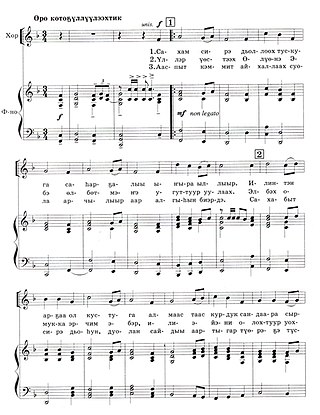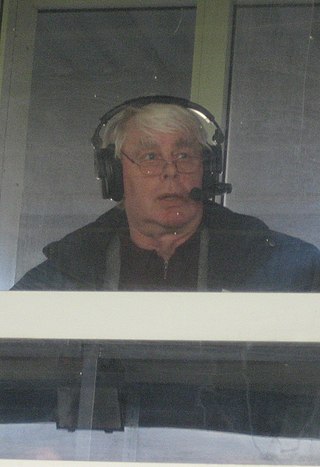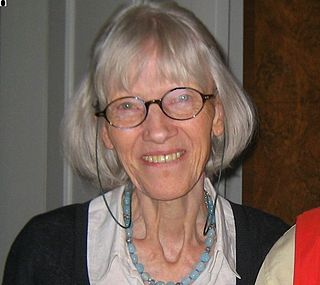Related Research Articles

Sakha, officially the Republic of Sakha (Yakutia), is the largest republic of Russia, located in the Russian Far East, along the Arctic Ocean, with a population of one million. Sakha comprises half of the area of its governing Far Eastern Federal District, and is the world's largest country subdivision, covering over 3,083,523 square kilometers (1,190,555 sq mi). Yakutsk, which is the world's coldest major city, is its capital and largest city.

Yakuts or Sakha are a Turkic ethnic group native to North Siberia, primarily the Republic of Sakha in the Russian Federation, with some extending to the Amur, Magadan, Sakhalin regions, and the Taymyr and Evenk Districts of the Krasnoyarsk region. They speak the Yakut, which belongs to the Siberian branch of the Turkic languages.
Ragna (Ragnheiður) Sigurðardóttir is an Icelandic writer, translator and artist. She studied at the Jan Van Eyck Academie in the Netherlands and also spent time in Denmark. In addition she studied French at Aix-en-Provence. In 1987 she debuted with a collection of her short stories and poems titled Stefnumót ("Date"), followed in by Fallegri en flugeldar, 27 herbergi and the novels Borg, Skot ("Shot"), Strengir ("Strings"), Hið fullkomna landslag and Bónusstelpan In her career she has been long-listed for the International Dublin Literary Award.

Ragnheiður Jónsdóttir (1646–1715) was a wealthy member of the powerful Svalbarðsætt family. She was married twice, each time to a Lutheran bishop of Hólar: Gísli Þorláksson and Einar Þorsteinsson. She survived both husbands and retired in 1685 to the farm of Gröf in Höfðaströnd, just south of the modern-day village of Hofsós, appointing her younger brother Oddur as ráðsmaður.
The Dance ) is a 1998 Icelandic drama film produced and directed by Ágúst Guðmundsson. It is set in the Faroe Islands and revolves around a wedding which is interrupted when a British fishing trawler is wrecked nearby. The screenplay is based on the short story Her skal danses by William Heinesen from Faroe Islands. It was filmed in the Faroe Islands with an Icelandic cast. It was entered into the 21st Moscow International Film Festival where Guðmundsson won the Silver St. George for Best Director.

Katrín Jakobsdóttir is an Icelandic politician who has been serving as the prime minister of Iceland since 2017 and a member of the Althing for the Reykjavík North constituency since 2007.
Sólveig Arnarsdóttir is an Icelandic actress. She is known for her performances in Stella í orlofi, Let Me Fall, Trapped, and Katla.

The state anthem of the Sakha Republic is the regional anthem of the Sakha Republic, a federal subject of Russia. It is one of the official symbols of the Sakha Republic, along with the flag and the coat of arms of the Sakha Republic. It was originally written in the Yakut language by Savva Tarasov and Mikhail Timofeyev. The anthem was translated into Russian by Vladimir Fedorov. The music was composed by Kirill Gerasimov. It was officially adopted on 15 July 2004. The anthem's music is played in F major.
Eduard Yefimovich Alekseyev was an Russian-born ethnomusicologist who had conducted extensive field research on traditional music in Siberia and other regions of the former Soviet Union. His research focuses on theoretical problems of mode and melodic intonation, timbre, and notations as well as on sociological and psychological aspects of musical perception. He has served as a chairman of the Folklore Commission of the Union of Soviet Composers from 1972 to 1992. He has also served as a director of the department of the General Theory of Folklore at the Moscow State Institute of Art Studies.

Bjarni Felixson, commonly known as Bjarni Fel, was an Icelandic footballer, sports reporter and commentator. Nicknamed The Red Lion due to his red hair, he won six caps for the Iceland national team between 1962 and 1964. He played for Knattspyrnufélag Reykjavíkur for several seasons, winning the national championship five times and the Icelandic Cup seven times. Following his playing career, he became a sports reporter and commentator for RÚV for 42 years.
Ragna Lóa Stefánsdóttir is an Icelandic former football player who played for Úrvalsdeild kvenna clubs ÍA, Stjarnan, Valur and KR. Ragna Lóa won 35 caps and scored two goals for the Iceland women's national football team.
Edda Heiðrún Backman was an Icelandic actress, voice actress, singer, painter and director.
Helga Bachmann was an Icelandic actress and director.
Hildur Sigurðardóttir is an Icelandic basketball coach and player. She is the former head coach of Úrvalsdeild kvenna club Breiðablik and an assistant coach to the Icelandic women's national basketball team. As a player she won the Icelandic championship five times and the Icelandic Basketball Cup three times. She was named the Úrvalsdeild Domestic Player of the Year four times and is the leagues all-time leader in assists She was the third player to reach 4000 points in the Úrvalsdeild kvenna. and remains second all-time in total rebounds in the league.
Ásgerður Júníusdóttir is an Icelandic singer, mezzo-soprano, and performer who has performed on stage and released music in Iceland and abroad.
The 2018–19 Úrvalsdeild kvenna was the 62nd season of the Úrvalsdeild kvenna, the top tier women's basketball league on Iceland. The season started on 3 October 2018 and concluded on 27 April 2019 with Valur winning their first title after beating Keflavík 3–0 in the Úrvalsdeild finals.
Erla Kolbrún Svavarsdóttir is a Professor in the School of Health Sciences within the Faculty of Nursing at the University of Iceland and Director of the family nursing section in a connected position at Landspítali University Hospital. Erla Kolbrún has for decades placed an emphasis on development of teaching in family nursing, in addition to developing and testing measuring instruments and therapeutic research in the field of family nursing and researching violence in intimate relationships and adaptation of individuals and family members to acute or long-term physical and mental illnesses/disorders.

María Lind Sigurðardóttir is an Icelandic former basketball player. She spent the majority of her career with Haukar with whom she won the national championship in 2009 and the Icelandic Basketball Cup in 2010, when she was also named as the Cup Finals MVP. During a game between Haukar and KR in March 2011, KR's Margrét Kara Sturludóttir struck María in the face with a closed fist. As a result, Margrét Kara was suspended for two games by the Icelandic Basketball Association, a ruling that was criticized by both Haukar and María Lind for being too lenient. In 2016, María transferred to Stjarnan where she would go on to play her final two seasons.

Valgerður Hafstað was an Icelandic painter who worked with acrylic, oil and watercolours. She was educated at the Academy of Free and Mercantile Art in Copenhagen, the School of Arts and Crafts in Reykjavík and Paris' Académie de la Grande Chaumière. Valgerður worked on mineral windows and mosaics and produced several privately owned paintings.
References
- 1 2 3 4 5 Daryana Antipova, "Songs of wind and cold" Archived 2013-10-17 at the Wayback Machine , The Moscow News , 10 June 2013.
- ↑ Kjuregej Archived 2013-07-06 at the Wayback Machine , Iceland Music Export, retrieved 14 October 2013.
- ↑ "Þjóðlög á jakútsku, rússnesku og íslensku", Veröld/Fólk, Morgunblaðið , 10 December 2011 (in Icelandic)
- ↑ Ylfa Kristín K. Árnadóttir, "Lævirkinn gamall draumur sem rættist", Morgunblaðið, 13 January 2012 (in Icelandic) (subscription required)
- ↑ "Ásgeir Trausti maður kvöldsins", Veröld/Fólk, Morgunblaðið, 20 February 2013 (in Icelandic)
- ↑ Ragna Sigurðardóttir, "Leyndardómar sköpunargleðinnar", Morgunblaðið, 25 March 2004 (in Icelandic)